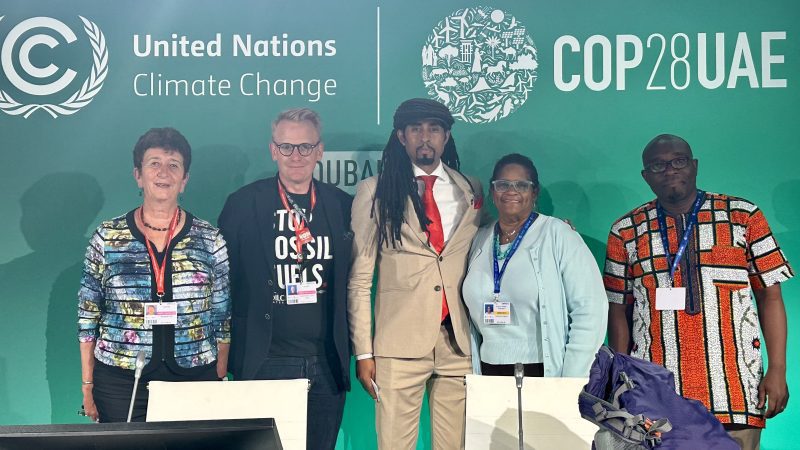Investigation finds fashion brands push pollution-emitting biomass boilers as sustainable solution
November 27, 2023
SAN FRANCISCO (Chochenyo and Karkin Ohlone Lands) — In an investigative report released today by environmental advocacy group Stand.earth, alarming findings shed light on the fashion industry’s significant reliance on biomass boilers as a supposed “green” alternative to coal and other fossil fuels. The report finds that major global fashion giants are hindering the sector’s transition to authentic renewable energy sources, despite the urgent need for sustainable practices amidst the escalating climate crisis.
The report, titled Biomass Burning: The Fashion Industry’s False Phase-Out, underscores that the fashion industry, responsible for up to 8% of global emissions, stands at a crucial juncture. Instead of transitioning to renewable energy alternatives such as wind or solar, several industry leaders are embracing biomass boilers. Contrary to claims of being “sustainable” and “green,” the report emphasizes the inherent risks and harms associated with biomass utilization, which undermines climate stability while also causing a devastating impact on the health of supply chain workers and their communities.
Biomass – defined as non-fossilized and biodegradable organic material originating from plants, animals, and microorganisms – is being positioned by the fashion industry as an alternative to fossil fuels. It is also used as the preferred means of accounting for reductions in carbon emissions within supply chains. Derived from sources such as wood pellets, crop residues, rice husks, straw, bagasse, and palm shells, biomass is incinerated to produce thermal energy, pivotal for various fabric-enhancing procedures. As many brands look to phase out coal, the adoption of biomass-fueled boilers is viewed by the industry as a quick and low-cost transformation plan.
The analysis delves into the practices of several global fashion giants, revealing a heavy reliance of biomass in their supply chains. Major brands are claiming that biomass boilers are clean and sustainable, a claim that lacks credible substantiation. However, after Stand.earth notified brands of the report, one brand – Fast Retailing – responded with an agreement to reevaluate their use of biomass.
“The bottom line is that there’s no such thing as ‘sustainable biomass,'” said Stand.earth Research Specialist Xixi Zhang, the lead author of the investigative report. “The increased reliance on biomass boilers poses severe threats to our climate, ecosystems, and human health, all while hindering the industry’s essential shift to renewable energy in Asia.”
The report urges fashion brands – such as Fast Retailing (owner of Uniqlo), Gap, H&M, Inditex (owner of Zara), Nike, and PUMA – to take the following steps to become truly sustainable:
- End transition to biomass: Fashion brands should cease the adoption of biomass boilers within their supply chain. Where possible, biomass boilers in use should be decommissioned with the costs of transitioning to clean alternatives supported by brands. Alternative, cleaner energy solutions like solar and wind should be pursued, with a focus on minimizing environmental and social trade-offs. They must also transparently communicate their actions to promote and invest in renewable energy among manufacturers and policymakers.
- Prove no harm: Fashion brands should commit to a comprehensive and well-executed plan for transitioning to renewable energy sources within their supply chains. As part of this, they should disclose energy use details, including type, origin, quantity, transactions, and carbon footprint, and disclose their compliance with international standards on business and human rights through detailed environmental and human due diligence, including stakeholder consultations. In addition, international fashion brands should avoid misleading claims and practices, and uphold the highest standards of sustainability in all aspects of their operations.
- Advocate for policy: Fashion brands should take full responsibility for their environmental and social impacts of their operations instead of relying on partner factories to address these issues. Brands need to actively engage in advocacy initiatives to influence policymakers and government institutions to endorse policies that facilitate the integration of renewable energy systems and the discontinuation of biomass within the fashion industry.
The report also profiles individual brands, including a breakdown of biomass feedstocks, supply chain analyses, and supply chain mapping.
“The prevailing trend of labeling biomass as ‘sustainable’ is a flawed narrative that overlooks the detrimental impacts on our environment and communities,” Zhang said. “It’s imperative that fashion brands prioritize long-term sustainability over short-term gains.”
Earlier this year, Stand.earth released its latest Fossil-Free Fashion Scorecard, which found fashion companies are not doing enough to move from climate commitments to actions at the scale desperately needed. The scorecard found an industry with more commitments to act, but still only a few pockets of progress toward supply chain decarbonization. Two-thirds of the total 43 companies assessed received an overall grade within the F or D range (D- to D+). One-third of companies assessed received an overall grade within the C range (C- to C+).
###
Media contact:
Shane Reese, Corporate Campaigns Media Director, shane.reese@stand.earth, +1 919 339 3785 (Eastern Time)



